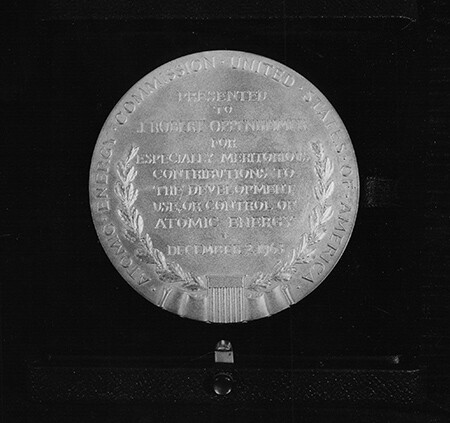PT archives revisited: Wheeler, Oppenheimer, and a fateful train ride
A periodic look at articles from the Physics Today archives and how things have changed since their publication.

John Wheeler, in happier times.
AIP Emilio Segrè Visual Archives, Wheeler Collection
Seventy years ago this month, physicist John Archibald Wheeler boarded an overnight train from Philadelphia to Washington, DC—and proceeded to lose a six-page classified document that listed secrets for building the hydrogen bomb. Wheeler’s extraordinary blunder, detailed in a 2019 Physics Today story
As Wellerstein described, Wheeler spent the night of 6–7 January 1953 on a Pullman train to Washington’s Union Station. He had brought the sensitive document with him to review before a scheduled meeting with the congressional Joint Committee on Atomic Energy. Something may have happened to the document that evening, when Wheeler read the pages in his private sleeping cabin, placed them in two envelopes inside his suitcase, and slept with the suitcase wedged between himself and the wall. Or it could have been the next morning, when Wheeler inadvertently left the outer envelope unattended in a toilet stall. He retrieved it after another man exited the stall. Upon returning to his seat, Wheeler discovered that the inner envelope, the one containing details of the H-bomb, was gone.

J. Robert Oppenheimer attends the Tenth International Conference on High Energy Physics at the University of Rochester in 1960.
AIP Emilio Segrè Visual Archives, Marshak Collection
Wheeler’s serious error yielded immense fallout, Wellerstein wrote. Among the historically consequential outcomes was that William Borden, chief of staff of the Joint Committee, was fired for his role in the security breach. Borden had commissioned the 91-page H-bomb report—Wheeler was reviewing a summary—to counter those members of the Atomic Energy Commission (AEC), particularly Oppenheimer, who had opposed development of the weapon. Soon after his removal, Borden would become convinced, without evidence, that the AEC and Oppenheimer were behind the loss of the document.

J. Robert Oppenheimer received the Enrico Fermi Award from the Atomic Energy Commission in 1963, less than a decade
AIP Emilio Segrè Visual Archives, Fermi Film Collection
In November 1953 Borden wrote a letter to FBI director J. Edgar Hoover in which he stated his belief “that more probably than not J. Robert Oppenheimer is an agent of the Soviet Union.” None of Borden’s charges proved true. Yet that letter, Wellerstein explained, became the excuse that Oppenheimer’s enemies were looking for to launch a campaign to destroy his career and reputation—a campaign that led to the revocation of Oppenheimer’s security clearance by the AEC.
It would take nearly seven decades for the Energy Department (successor to the AEC) to vacate that decision
To this day, nobody knows what happened to the six pages that Wheeler lost on the train. An FBI investigation
More about the authors
Andrew Grant, agrant@aip.org




